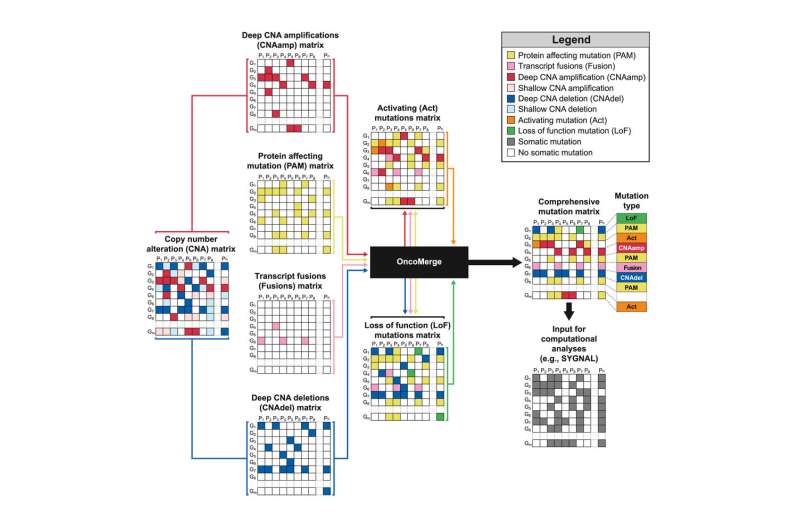This article has been reviewed according to Science X's editorial process and policies. Editors have highlighted the following attributes while ensuring the content's credibility:
fact-checked
peer-reviewed publication
trusted source
proofread
Genetic analysis tool developed to improve cancer modeling

Lifestyle behaviors such as eating well and exercising can be significant factors in one's overall health. But the risk of developing cancer is predominantly at the whim of an individual's genetics.
Our bodies are constantly making copies of our genes to produce new cells. However, there are occasional mistakes in those copies, a phenomenon geneticists call mutation. In some cases, these mistakes can alter proteins, fuse genes and change how much a gene gets copied, ultimately impacting a person's risk of developing cancer. Scientists can better understand the impact of mutations by developing predictive models for tumor activity.
Christopher Plaisier, an assistant professor of biomedical engineering in the Ira A. Fulton Schools of Engineering at Arizona State University, is developing a software tool called OncoMerge that uses genetic data to improve cancer modeling technology.
OncoMerge is a platform that detects abnormal gene fusions as well as mutations that affect protein expression and how many times a gene is copied. The software then analyzes the network behind the mutations to reveal connections and develop a model to predict future changes caused by the mutations.
"We are able to look at the gene expression patterns using correlation," says Plaisier, who is also an associate faculty member in the ASU Biodesign Center for Biocomputing, Security and Society. "Then we can see what is being activated or repressed, which allows us to look at the deeper functions behind that."
Plaisier has been reflecting on the idea of OncoMerge since his postdoctoral work, during which he first noticed a need for a platform that could process the network behind mutations. The effort combines his expertise as a human geneticist, computational biologist and cancer biologist into a single project.
His most recent research tackles gene mutation detection challenges by designing a database that uses genetic data to analyze linked activity within the networks. The results are published today in the journal Cell Reports Methods.
Data-driven discovery
The information derived from examining genetics has countless potential health care applications but is especially valuable for understanding cancer. Due to the significant variation among forms of cancers, Plaisier is enhancing prediction models that can offer insight into specific cancer environments.
While designing OncoMerge, his team verified that the feedback networks of certain regions in the genome were enhanced to establish an abnormal regulation of networks. This selective cultivation showed the tumor manipulating its environment to sustain itself.
OncoMerge has been applied to more than 9,000 patient tumors to validate the team's methods and confirmed that integrating the mutation data did improve the accuracy of predictions for linked behavior among genes.
Plaisier hopes his software will be integrated into analyzing cancer mutation pipelines and eventually be able to enhance precision and process genetic information in individual cells.
Data science in education
Beyond improving cancer modeling techniques, Plaisier wants to advance data science education. He would like to create a data science elective course for biomedical engineering students and has been an active voice for including more introductory coding courses across majors to get students better acquainted with coding techniques.
Sierra Wilferd, a biological design graduate student in Plaisier's lab, appreciates the interdisciplinary approach.
"Seeing how cancer biology and bioinformatics interact has taught me the importance of applying lab skills and computational skills to ask and answer interesting questions," Wilferd says.
Humans are extraordinarily complex biological systems, so the ability to collect and understand biological data is critical for combatting disease. For research studies of patient tumors, Plaisier's OncoMerge software could become another important step in the genomics data pipeline and have a significant impact on all cancer genomics studies.
More information: Christopher L Plaisier et al, Systematic integration of protein affecting mutations, gene fusions, and copy number alterations into a comprehensive somatic mutational profile, Cell Reports Methods (2023). DOI: 10.1016/j.crmeth.2023.100442. www.cell.com/cell-reports-meth … 2667-2375(23)00057-7

















